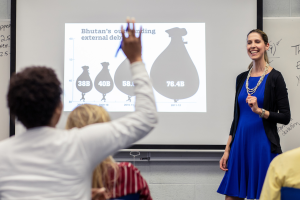Avg. Salary
per year (2022)
Widener’s health professions education doctorate program puts you on the inside track to greater leadership through education, research, and innovation.
Doctorate
Hybrid (Online & On Campus)
57
3 years
Widener's PhD program in health professions education empowers you to become an agent of change in an academic setting. Designed for students who already possess a master’s degree or clinical doctorate in a health professions-related field, the program focuses on three tenets:
Offered in a hybrid (online and in-person) format, the doctorate in health professions combines both a teaching and research core, giving you the unique flexibility to be equally prepared for faculty positions in graduate health education programs and research positions within your realm of clinical expertise. You'll engage in authentic application of educational and research theory, supported by faculty who bring active clinical and academic research experience to the classroom. And through our on-campus, interprofessional pro bono clinics, you'll gain perspective on using evidence-based practice to impact the local community.
Today, health professions programs commonly require a doctoral degree beyond a clinical doctorate for tenure-track faculty. Given the expansion of health professions programs, the number of faculty retiring, and the shortage of doctorally-prepared educators, you'll graduate well-positioned to prepare the next generation of health professionals and emerge as a scholarly leader within your field.
The PhD program in health professions education combines a teaching and research core.
Loading... in the academic catalog.
per year (2022)
Employment in health care occupations is projected to grow through 2032, much faster than the average for all occupations.

Learn from faculty mentors who use their clinical and academic experience to fuel your journey. Engage with classmates who bring backgrounds in a wide range of health professions into class discussions and out-of-class conversations. Work collaboratively with professionals from neighboring fields as you focus on issues in health education, health care, and social justice. You'll graduate with an interprofessional perspective that sets you apart from your peers.

Our PhD program will prepare you for two powerful roles: a faculty position in a graduate health education program and an educational researcher role within your discipline. No matter which path you choose, you'll graduate ready to impact health care and health professions education.

Develop into a leader within your respective health profession. The initial peer-reviewed presentations and publications that arise from your dissertation will serve as the starting point for lifelong scholarship. And the knowledge and experience you gain will prepare you to educate the next generation of health care professionals.
Our admissions and financial aid teams are here to support you every step of the way. Have a question? Ask away!
Note: There is no test requirement for admission into this program.
Widener transfer applicants follow the same application process as general applicants. After you apply, our admissions team will work with you to determine whether completed undergraduate and graduate coursework will count towards foundation/core courses that can be waived or substituted.
Widener University serves as a "second home" for students from around the world. We are located just outside of Philadelphia and close to New York City and Washington, D.C.—offering many unique professional and personal opportunities to explore.
Want to know what it's like to be an international student on campus or need assistance navigating English proficiency requirements? We're here to help, and our international admissions director will support you through the application process. This support doesn't end with admissions—our International Student Support team will serve as a valuable resource throughout your Widener journey—meeting Visa/immigration requirements, getting acclimated to campus, and much more.
Learn more about applying as an international student
Learn more about life at Widener as an international student
Because Widener is a private institution, we're able to offer financial assistance that brings our education within reach for individuals who might otherwise not be able to afford it.
You might be surprised how much we are able to offer.
Getting started is easy. Simply apply to Widener and submit your FAFSA to be automatically considered for scholarships and grants. "FAFSA" stands for the Free Application for Federal Student Aid and helps identify whether you are eligible for aid awarded by Widener, the government, and other sources. Our school code is 003313.
In order to receive a financial aid offer, students must meet certain eligibility requirements. Here are the general eligibility requirements for most financial aid programs:
Learn more about applying for financial aid as a graduate student
Simply apply to Widener and complete the financial aid process to be automatically considered for scholarships and grants. Because Widener is a private institution, we are able to offer financial assistance that brings our education within reach for individuals who might otherwise not be able to afford it. You might be surprised at how much we are able to offer in assistance.
In order to receive your part of the financial aid pie, all you have to do is submit your FAFSA. "FAFSA" stands for the Free Application for Federal Student Aid and helps identify whether you are eligible for aid awarded by Widener, the government, and other sources.
Widener offers a limited number of graduate assistantships to enrolled students. GAs receive tuition assistance for their work. Once you're a student, contact your program director for more information.
Widener University also partners with many local organizations and corporations to offer discounted tuition and other incentives to their employees. Don't see your company on the list? Ask them to become a partner. In addition, employers often offer educational reimbursement benefits. We encourage you to explore these opportunities and will be glad to provide any necessary documentation.
A limited number of university-based scholarships are made available to enrolled graduate students made possible directly from our academic department or thanks to the generosity of university donors. No extra steps are needed to be taken prior to admission. Once enrolled, contact your program director to learn more.
If you graduated with a degree from Widener, you may qualify for a 20% tuition discount. The first step to see what you qualify for is to submit your application. Widener offers students many paths to savings, and while we don't offer "double discounts", we'll make sure you'll get the biggest financial benefit you're eligible for. Only students who have completed an associate's, bachelor's, master's, or doctoral degree are eligible. Students who have pursued a 4+1, 4+2, or 3+3 pathway, graduate assistantship, Widener-funded scholarship, or other tuition discount may not be eligible if the financial discount granted surpasses 20%.
Tuition rates are subject to change. Official costs for your first year will be determined at time of enrollment.
To visit Widener is, often, to fall in love with the place. To fit your timeline and schedule, we offer a variety of ways to get to know us.
We offer a variety of virtual events to get to know Widener and meet with faculty and admissions staff.
Have a question about Widener? Drop us a line and an admissions counselor will be in touch. We're always happy to help!
Visit our online application system to complete your app and share supplemental materials. There is a $35 application fee to apply to Widener.
Hyatt Hall
14th St
Chester, PA 19013

Hyatt Hall, Office #320

